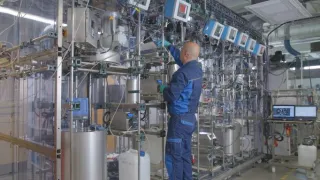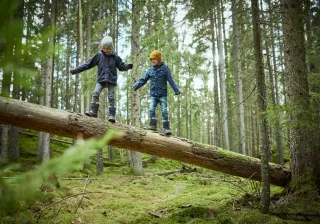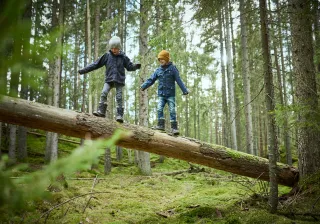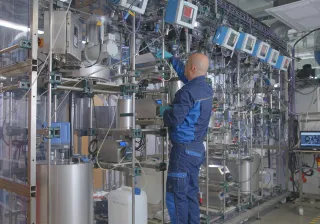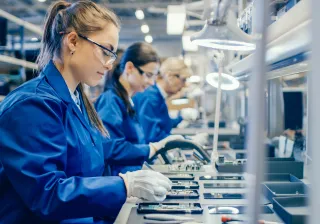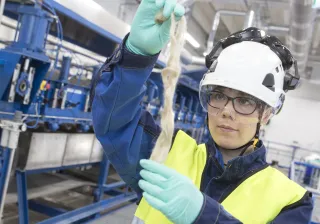For the green transition required by the energy crisis to be realised, better utilisation of side streams and waste from the mining and metallurgical industry is of paramount importance. VTT is now investing even more strongly in research in the field by establishing a new research professorship. Päivi Kinnunen, a leading researcher in the field, D.Sc. (Tech.), docent, M.Sc. (Econ. & Bus. Adm.), has been appointed to the professorship for a period of two years. Kinnunen emphasises that more metals need to be recovered from less for the transition to be possible.
“Due to the war in Ukraine, the green transition of the energy sector and the electrification of transportation are even more urgent and critical in terms of security of supply in Finland and the whole of Europe. However, the transition is not possible without extractive minerals, and for now, Europe is largely dependent on raw materials from elsewhere, such as Russia and China. This is why VTT strengthens research in a critical field for the whole of Europe now,” says Director Tua Huomo.
VTT has established a new two-year fixed-term research professorship in the field of industrial circular economy, utilisation of mining industry side streams and hydrometallurgy. Päivi Kinnunen, D.Sc. (Tech.), docent, M.Sc. (Econ. & Bus. Adm.), has been appointed to the Circular Economy of Energy Metals research professorship from October 1, 2022. Kinnunen has been working at VTT for years as a research team leader and as a leading researcher in the field.
The best ore bodies have already been used, and the focus now has to be on utilising side streams
According to Kinnunen, it is now of utmost importance to find ways to more efficiently recover all valuable minerals suitable for further use from, for example, side streams of mines and other waste streams. The Geological Survey of Finland (GTK) has calculated that the global green transition of metal production would take hundreds if not thousands of years with current metal production volumes and usage technologies. For example, twenty years from now, 20 times the amount of cobalt and nickel would be needed, and up to 40 times the amount of lithium.
"The war in Ukraine has made the need for the fastest possible energy transition and energy self-sufficiency even clearer. However, all fossil-free forms of energy such as wind, solar or nuclear power require metals present in our soil to function. The same can also be said about, for example, electric cars, laptops or smartphones. At the same time, when the need is even greater and growing explosively, metals are available even more scarcely, because the best ore bodies have been used long before the energy crisis. Sometimes there is even more metal in the waste materials than in the mine itself. So if we want to keep up with technological development, we have to find not only new ways to utilise metals but also to reduce their use in batteries, for instance,” says Kinnunen.
Financial and environmental benefits at the same time
VTT has its own globally significant pilot plant in Espoo's Kivenlahti, where it is possible to study and test in practice how to recover more than, say, a certain base metal as efficiently as possible from various material flows. One of the things being studied at the Bioruukki plant is whether, for example, in addition to zinc, iron could be separated from the same material into a water purification chemical.
"In general, our goal is to look at the material flow as comprehensively as possible, and we do vast amounts of research on waste, for example, how tailings from mines could be utilised. These are exactly the things that, if poorly managed, can cause harm to nature, and we have studied whether raw materials could be recovered from them and at the same time make the waste less risky. When the material has already been dug out of the ground and ground up, it should be used to the maximum. Closing water cycles is also very important from the point of view of the environment", Kinnunen remarks.
According to the newly appointed research professor, the responsibility of the mining industry is in the interest of everyone – both consumers and companies. Currently, the industry is developing the traceability of materials at a fast pace, so that we can monitor as precisely as possible that they have been produced both socially and environmentally responsibly. The research and better recovery of metals steered by VTT also create investments and new business opportunities for both technology developers and those who have the materials. At the same time, VTT is developing technologies that can be used globally.
"VTT has excellent cooperation with companies and other research organisations in Finland, but also internationally. Our pilot plants and expertise are available to all interested, and we invite everyone to join us in solving one of the key issues of our future. Although the challenges are big, we have available and are developing new solutions for the material needs of the green transition," Kinnunen concludes.
More information:
Päivi Kinnunen
Research professor, VTT
Tel. +358 40 178 0127
[email protected]

